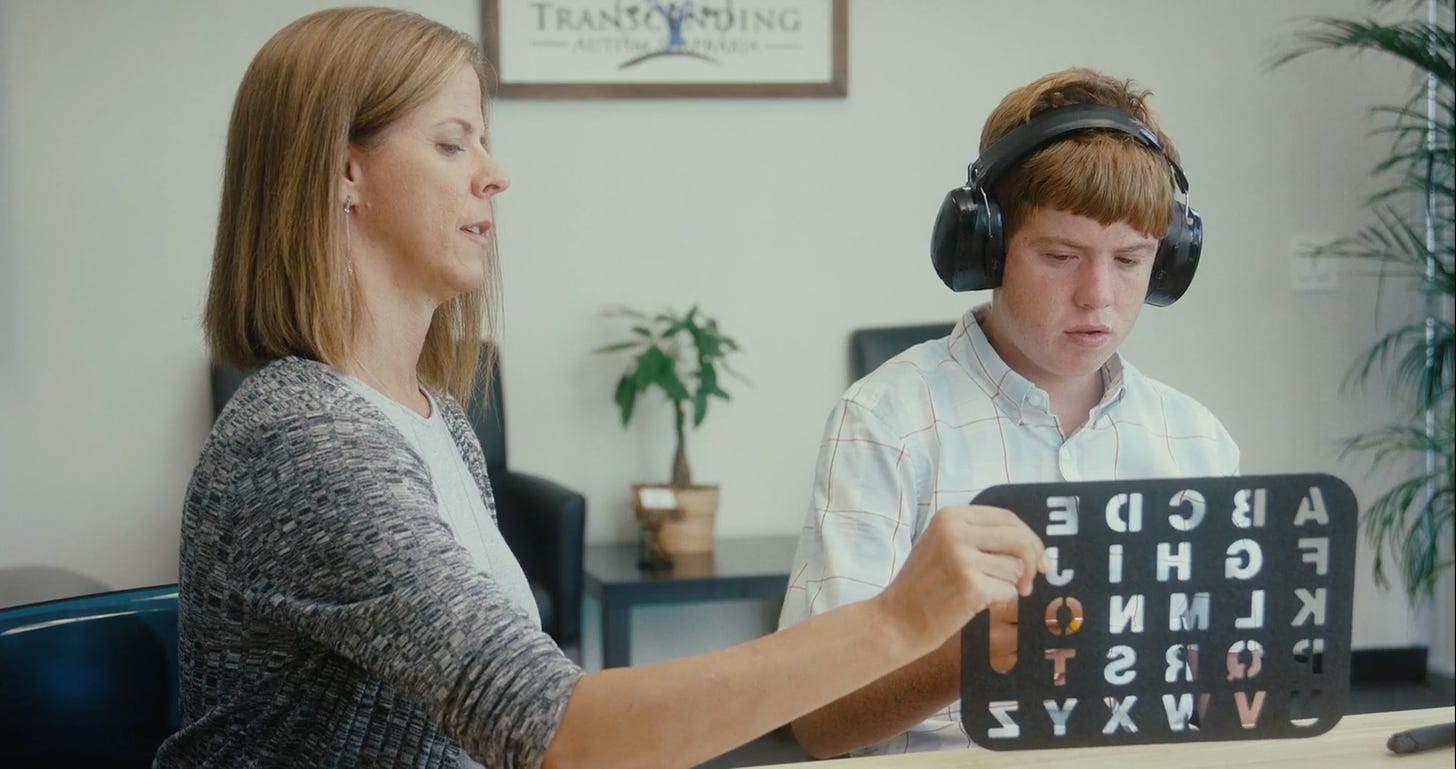SPELLERS has documented a miracle
For my friend, JB Handley, and his champion speller, Jamie.
I know you all will ask when and where you can see this life-changing film. I’ve heard rumors that it’s launching April 2nd, on World Autism Day. Stay tuned, I’ll let you know how see it. In the meantime, follow the SPELLERS Instagram and sign up for the SPELLERS mailing list for news.
When the opening scenes of SPELLERS began, for a moment I doubted that I would make it through the film that day. JB Handley has been many things to me in our seven-year friendship. A force. A shield. A contributor, a voice, a friend. A big, strong, soft-hearted human in need. A ray of hope who needs an occasional spiritual pep talk to make it through a dark day. I haven't met JB's son, Jamie, but I've said a few words to him when JB puts our calls on speaker. JB tells me about Jamie's big smile as he listens. Jamie is autistic and doesn't talk, and he's been that way since he was a toddler.
The film opens with another young man, Cade Larson, filled with joy, cruising past the camera on a surfboard.
I've had the pleasure of spending several days with Cade, over a couple of trips. My children have sat with him at the dinner table, munching on tater tots at the country club near his Minnesota home. Cade is also autistic and has echolalia but otherwise doesn't speak. While he helplessly repeats everything said to him, you know he means "yes" with the enthusiasm he infuses into his echos. Yes, he wants all of us to go on the boat. Yes, he wants two orders of tater tots for dinner tonight. No, he doesn't want the dogs around.
Then, the first mother to speak, is April Boden. That's when I considered turning the movie off because it all feels like too much right now.
I don't personally know April in real life. Although we talked, years ago, about having a phone call, it never came to be. April was best friends with Liam Scheff. She was with him as he suffered through the physical debilitation that ultimately led him to take his life in order to end the unbearable suffering. I've written about Liam in the past, and, in fact, just reposted something about him a few days ago. Liam has been on my mind, endlessly, for the last two weeks. I've thought about Liam too many times to count since COVID took over all of our lives, and I've desperately wanted to know what he would have to say about it all. And here, in the middle of all of that, is his best friend and her autistic son on my computer screen. More than anything, I wish Liam was here to see this miracle revealing itself in April's life.
When JB called three years ago, to tell me about the breakthrough his son had with the Spelling to Communicate (S2C) program, I simultaneously fell to pieces over my mistaken beliefs, and rejoiced for his family, and all of the families who would benefit from his personal discovery, and the platform from which he would launch it. Imagine believing, as I wholeheartedly believed for a decade, that autistic people had an average IQ of 70. Imagine believing that about your own child. Sit for a moment with the guilt and the regret these parents feel.
Then imagine the unraveling, the blossoming, and the new beginning that happens when they, for the very first time, reap the benefits of being shown just how wrong they were.
In November of 2020, JB sent a PDF of the final version of his book this movie is based on, written with Jamie and called Underestimated. It was about the wild ride they were on with communication and their whole new father-son relationship. I turned into a blubbering mess all over again. "Not a page went by without tears in my eyes," I wrote back. "There is no other way to be while watching a miracle unfold."
Spelling to Communicate is founded on the premise that autistic people are free of cognitive impairment; it’s their motor planning that has been damaged. Speech is 100% motor planning, but not language. Language is cognitive. Think of someone you know who’s suffered a stroke and lost the ability to speak the way they used to. You plainly see they’re struggling to get the words out, but you don’t doubt for a moment that they have the words. The language is there for them. And the language is there for autistic people, too. Across the board.
From the movie, it seems the therapists begin with full-body gross motor therapy exercises, moving to smaller and smaller movements. Eventually, the student holds a pencil. When asked a question, they poke the pencil through large letters printed with the first half of the alphabet or the second, spelling out their answers. When the largest stencils are mastered, they move to a smaller stencil with the whole alphabet.
When the smaller stencil is mastered, they move to touching letters on a laminated sheet, and then to pecking away on a handheld keyboard. And, in the case of JB’s son Jamie, typing on a mounted keyboard, which is the PhD of Spelling to Communicate.
From the very first stencil, it’s obvious that not only are these kids brighter than the 70 IQ we’ve all been told they’re limited to, but they are far more intelligent than most of us—and I’m not pandering when I say that. These people, who are treated as if they are stupid, as if they are a burden on society, are far smarter than you and me—and they are far more perceptive, empathetic and forgiving. They have prior knowledge from topics no one bothered to teach them. Heck, no one even taught them to read, but they know how. When asked to articulate their feelings about themselves and others, they become poets.
And you know who is good at mastering Spelling to Communicate?
Every single one of them. Without exception.
I know it’s difficult, if not impossible, for many parents of non-speaking classically autistic kids to accept the idea that their child can do this. I’m telling you, there are no exceptions. They can all do this. There may be years of shame and heartache standing in the way of hope, but the child can do this.
Dawnmarie Gaivin is the hero, mother, teacher, and motivator of SPELLERS. Not only does she have an autistic son, but she has two. She is often the first person parents hear say, “Presume intelligence.” She doesn’t doubt these kids for a moment. She doesn’t get frustrated. She does not quit. How does it feel to wake up every morning and go save some lives? Dawnmarie knows. You can find her website here. Send it to someone in your life who needs to know about her. Someone who needs to find their hope.
Many of you may remember a program called “Facilitated Communication” from the 80s and 90s, and I want to be crystal clear: this is not FC. No one is moving the stencils around. No one is holding the student’s hand. No one is guiding anyone. It is the student, not the teacher, doing the spelling, and it’s all captured on video as proof.
Why can’t autistic people all sit down at a computer and type, you may wonder? I’ve heard of a couple of non-speaking autistic people over the years who were able to do that. But, almost universally, fine motor control is impaired in autism. That’s what speech is, and that’s what typing is—fine motor control. But gross motor control, like poking a pencil, is not nearly so impaired, so the teachers begin there.
JB shared with me that after his son mastered the stencils and the laminated sheet, it took Jamie 10 months to move from having a keyboard held out in front of him, to being able to type on a mounted keyboard with no one holding it.
“Why?” I asked. “What reason would Jamie give?”
“The mounted keyboard board made Jamie anxious,” he said. “And when he’s anxious, he can’t spell.”
Jamie’s explanation reminded me of my fear of box jumps in Crossfit. I was afraid of missing the top of the box and scraping my shins and no amount encouragement could change that. Instead, I’d stack the 25-pound plates one on top of another and jump on those—despite them eventually being just as high as a box. The box gave me anxiety; I couldn’t do it. Even today, I would refuse to jump on a wood box.
I feel you, Jamie. I get it. I’m so very proud of you for showing the world it can be done, even in the face of crippling anxiety.
Like any good miracle story, there’s a dark shadowy figure lurking in the corner, wanting to keep parents believing that their children can’t communicate. It doesn’t want the world to know about this program. It doesn’t want parents to have hope.
That figure is the American Speech-Language-Hearing Association, or ASHA. ASHA certifies all of the Speech-Language pathologists in public schools, in hospital settings and therapy centers. ASHA’s position is that the S2C kids aren’t communicating anything from their own minds; it’s the teachers doing it for them. And ASHA’s certified speech pathologists have been warned, and are so terrified of having their licenses revoked, that they refuse to be in the same room with an autistic person wishing to communicate through a spelling board or even a mounted keyboard.
They can’t have their minds changed if they don’t see it.
Aren’t you so tired of this same old trope? The billion dollar industries of speech pathology and Applied Behavior Analysis (ABA) don’t want the truth coming out. I do hope you take that into consideration today and tell every single person in your life about this upcoming film.
And make no mistake, disabled students are entitled, under federal law, to effective communication, and that means the right to any materials and methods they need to communicate. If your non-speaking child learns to communicate with S2C, they are entitled to communicate at school through S2C. Advocate for them and do not give up.
In one scene towards the end of the film, Cade said, "I'm good at this and will become independent." When asked, "What do we need to help non-speakers?" Cade answered, "I think knowing that we are intelligent and treating us with respect helps."
I remember when I spoke to Cade, years ago. I used that sing-song tone that I haven't used with my own kids since they were toddlers. He was an 18-year-old young man. I want to crawl under a rock.
Cade, if your mother shows you this review, I want you to know that I am sorry. You are an intelligent young man and I didn't speak to you in the way you deserve to be spoken to. I didn't presume your intelligence or your competence and I am so, so sorry.
In my favorite scene, Sid, a non-speaking boy in Portland, Oregon, who has both autism and Down Syndrome, when asked, "Can you control your thoughts?" spelled out, "I'm a rudderless ship in the sea of thought."
I’ll say it again: these kids are poets.
There are tens of millions of people in the world who have no voice because we haven't been listening, and their parents have lost hope.
Let’s open the floodgates and let the hope out.
You can donate to sponsor a speller for five sessions by giving here. Any amount you give makes a difference.







17 years ago, after my nonverbal 3 year old autistic son exhibited signs of being able to spell using his letter magnets, we bought him a talking dictionary off of Amazon. It opened up a whole new world of communication, and we learned he could speak in complete sentences! He did finally master his speaking voice at almost 8 years old, but for five years we were blessed to be able to get to know our son through the gift of spelling. ❤️
My son is a speller. Thank you for this beautiful review and for believing in them ❤️